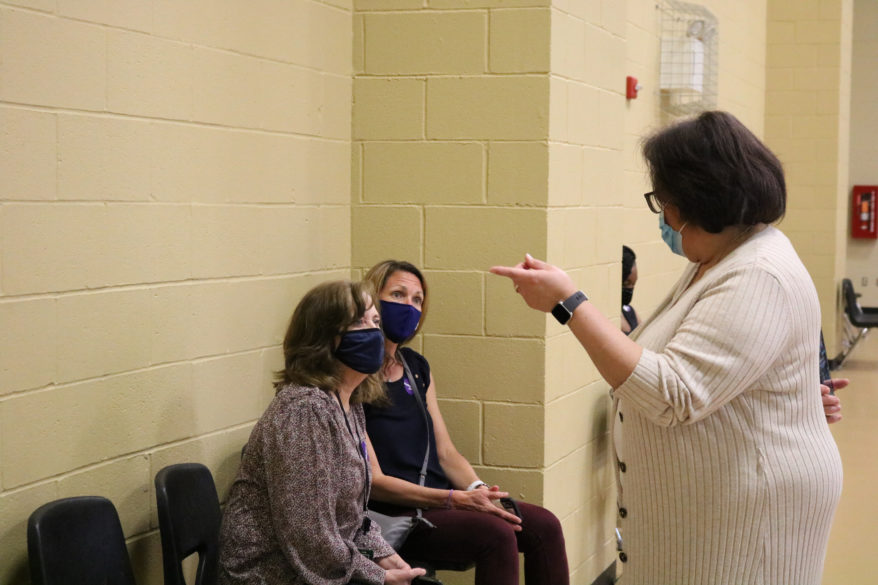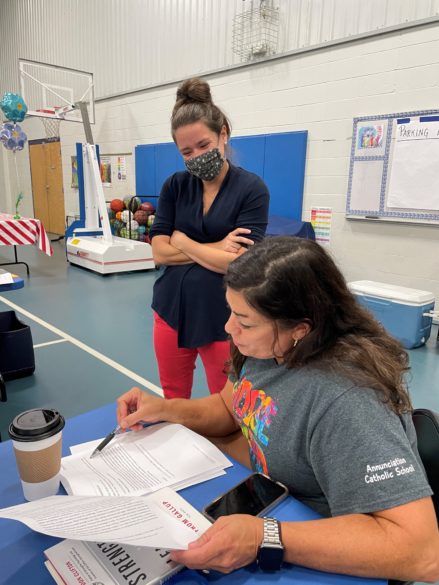By Joanna Puddister King and Stephanie Brown
JACKSON – The 2020-2021 school year was one like no other before it. First, the pandemic challenged the Office of Catholic Education to assess how it has functioned and how they can best support schools in the diocese. As schools navigated the year, new tasks and responsibilities were created to deal with the demands of virtual learning, contact tracing and overall management of our response. Then, in March of 2021, it was announced that Superintendent, Cathy Cook, was planning to retire.
When Cook’s retirement was announced, it opened the door for the office to critically examine how to address areas of improvement that they observed during their system-wide accreditation that came to fruition in October 2019; as well as, make any changes to the structure of the office.
“To help us better understand our schools’ current trajectory, we decided to dive into as much data as possible. We looked at survey results, enrollment, and finance figures, as well as current policies. After looking at everything, it was determined it is time to do something different. One theme that we focused on was the difference between a public-school superintendent and a Catholic school superintendent. While their titles are the same, the scope and authority of the roles are very different,” explained Karla Luke of the Office of Catholic Education.

The office even reached out to Kathy Mears, a senior consultant for the National Catholic Educational Association, to discuss national trends that should be considered. “She explained that many dioceses across the country are reevaluating the structure of their education offices to try to meet the needs of their schools better,” said Luke.
After much discussion and research, the office decided to make a move. Rather than seek to fill the superintendent position, it was decided that the Office of Catholic Education would have three new positions: executive director of school operations, director of curriculum and development, and coordinator of school support. Luke, believes that a change in title and reassignment of responsibilities will better articulate what the office does to best serve schools in the diocese.
Luke has assumed the position of executive director of school operations for the diocese. In this role, she will continue many of her responsibilities as associate superintendent and interim superintendent. In addition, this position will oversee the diocesan advisory council for education, local school advisory councils, personnel and legal issues, parent and student concerns, and government programs.
Stephanie Brown, the former assistant superintendent, assumes the position of director of curriculum and development. Previously, Brown oversaw the accreditation process, curriculum, assessment and professional development. In this new role, she will also work closely with the Department of Temporal Affairs on ensuring financial viability and increasing enrollment in all diocesan schools.
The third position in the restructured office will be the coordinator of school support. This role will be similar to an administrative assistant but will play an active role in daily operations at diocesan schools. “We hope that this position’s addition will help us streamline many of our administrative tasks, such as record-keeping and verification, school reporting and textbook procurement,” said Brown. They are actively looking for the right person to join the office in this new role.
The Office of Education, working in its newly established structure, recognizes that they have a great deal to be proud of and a great deal of work to do moving forward; and have set five areas of focus for the coming year and beyond.
Their number one priority will be focusing on marketing, development and advancement. While increasing enrollment is always a goal, the office recognizes that they must also seek alternative sources of income outside of just tuition. “As the cost of living rises, we must find the funds necessary to provide all staff members with equitable wages that they deserve while also pursuing the resources and infrastructure needed to provide the highest quality of education to all of our students” said Luke. “It is important to look for other ways to keep our schools financially viable outside of raising tuition.”
Second, the office hopes to improve their service and outreach to minority communities across the diocese. “When we look at enrollment trends at our schools that serve our minority communities, we see a larger decline in enrollment,” said Brown. “We have challenged ourselves to find ways to better meet the needs of these communities by looking at barriers to accessibility.”
Their next goal is to continue to focus on college and career readiness, with a large emphasis on career planning. “We hope to help our students identify their God-given strengths and talents and set them on a path toward success in a career they will enjoy by providing the tools they need to adequately prepare for college or whatever their next step may be,” expressed Brown.
Additionally, the office also hopes to standardize clerical tasks completed at schools across the diocese. Brown said that they found that many staff members and administrators at schools spend time doing tasks that could easily be consolidated and performed at the diocesan level. “With the addition of the Coordinator of School Support, we hope to find ways to free up the time of our administrators by taking these tasks off of their plate.”
Finally, just as the office evaluated roles and job descriptions, they hope to spend time clarifying job descriptions for all positions within our schools. “Accountability is the key to forward movement. We hope that by clearly delineating responsibilities, everyone can better understand their role in moving our school communities forward,” said Luke.

